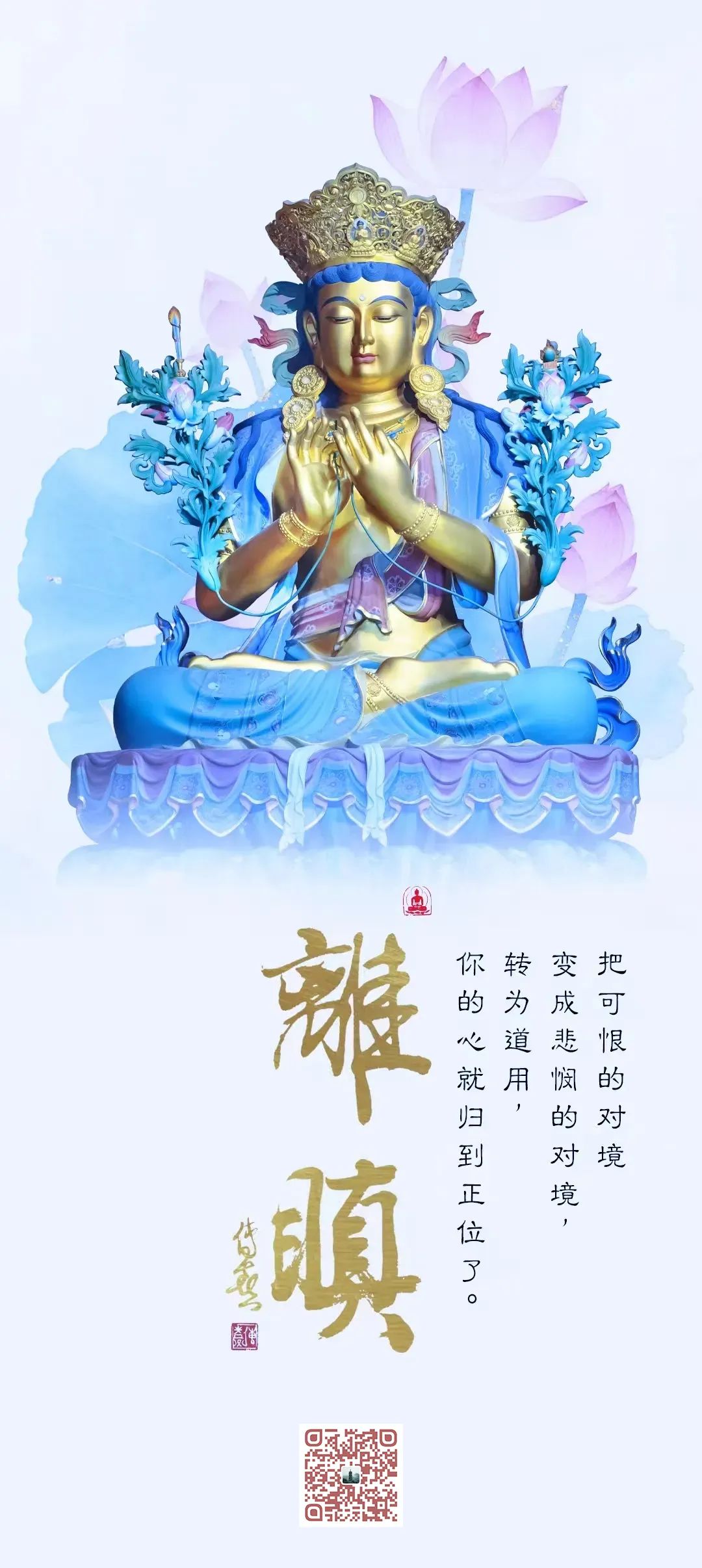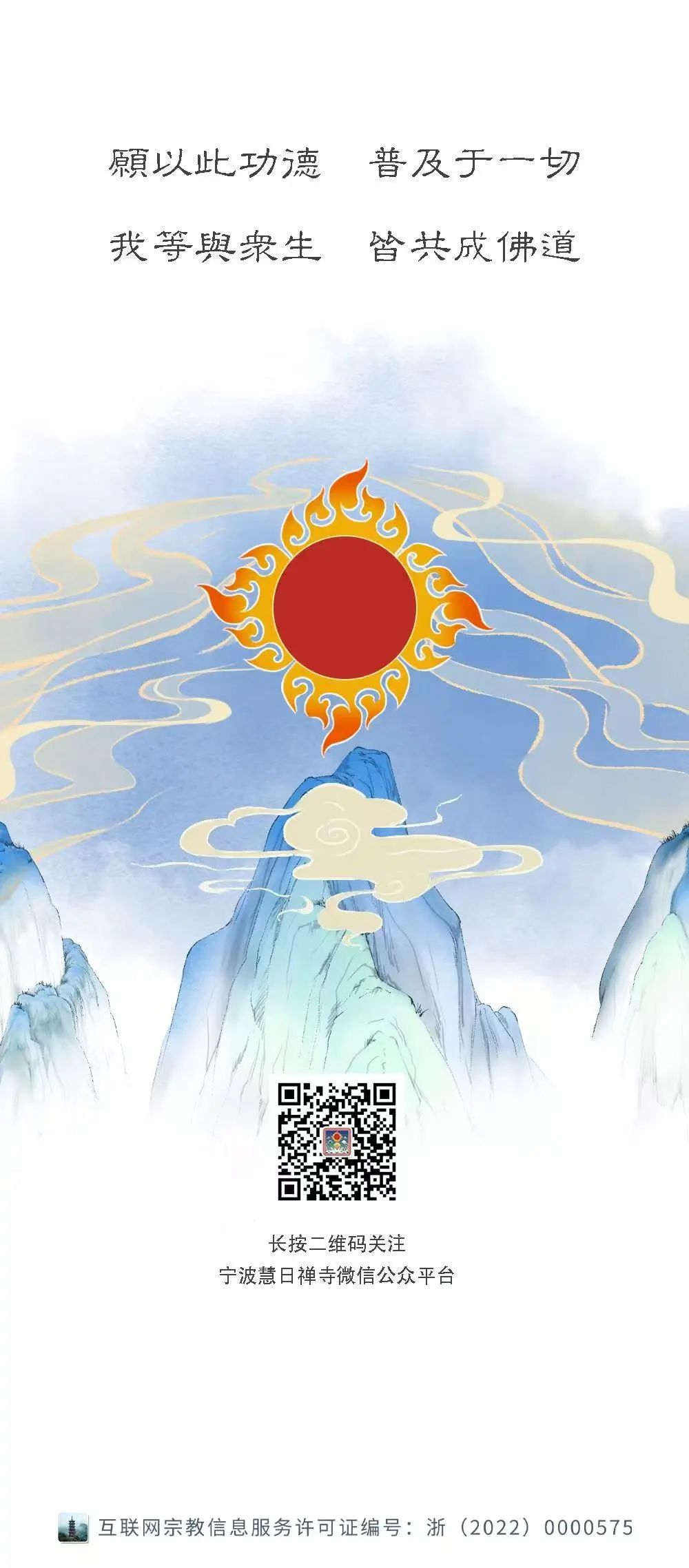对境考验面前,如何善护其心?



对境面前
如何善护其心
When Facing Adverse Conditions, How to Safeguard the Mind?
Namo Buddha .
01
普皆恭敬
《杂譬喻经》中讲过一个故事:古印度有一座寺院, 住着百余名僧众。距寺院不远处,住着一位潜心向道的女子,她每天供养一位出家法师,然后在其座下恭敬听法。一天,轮到一位老比丘前去应供讲法。他年岁已高、刚出家不久,对许多经义尚不了解,但又不知该如何婉拒,只好硬着头皮,拖着沉重的脚步前去。
The Miscellaneous Parables Sūtra (Zá Pìyù Jīng) recounts a poignant story:
In ancient India, there stood a monastery inhabited by over a hundred monks. Not far from this sanctuary lived a woman of profound sincerity, devoted to the Dharma. Each day, she would offer sustenance to a monastic and, with reverent heart, listen to the teachings imparted.
One day, it was an elderly monk’s turn to receive her offerings and give instruction. Though advanced in years, he had only recently taken monastic vows and had yet to gain full understanding of many scriptural doctrines. Though he felt unsuited to the task, he did not know how to politely decline. Resigned, he took up his staff and made his way to her dwelling, his steps heavy and uncertain.
这位女子见老比丘的步履如此“安稳”,就对他生起了极大的信心,认为他必定是个有智慧、有定力的大修行人。进入屋里,老比丘心情七上八下,享用斋饭的时间拖了很长。然而,漫长的等待,丝毫未减少这个女子求法的诚心。
Observing the venerable monk’s slow and composed gait, the woman was filled with confidence and reverence. She assumed he must be a great cultivator, rich in wisdom and deep in meditative stability. Inside her dwelling, the monk, anxious and uneasy, took an unusually long time to partake of the midday meal, uncertain how to proceed. Yet the woman’s sincere to hear the Dharma remained undiminished by the wait.
午斋过后,她虔诚地请老比丘说法。老比丘惶恐不已,想到自己一大把年纪才出家,对深奥的佛法不明究竟,心里既惭愧又苦恼,不禁感慨道:“愚痴无知,缺乏智慧,实在非常痛苦啊!”女子听了这段话,以为是给自己开示的,就仔细体会其中的意义,明白了由无明产生痛苦……在反复思维的当下,她竟证得了圣果。
After the meal, she humbly requested him to give a teaching. The elderly monk, overwhelmed with anxiety, was struck by the disparity between his meagre understanding and the gravity of his role. Grieved and ashamed, he muttered aloud: “To be mired in ignorance, lacking in wisdom—how deeply painful it is!”
Hearing these words, the woman mistook them for a profound teaching. She turned them over in her heart, contemplating their meaning. Through deep reflection, she came to realise that all suffering arises from avidyā—ignorance. In that very moment of insight, her mind was purified, and she attained a level of realisation—a saintly fruition (śrāvakaphala).

Namo Dharma .
02
大清净 大平等
Great Purity and Profound Equality
有位尊者说:“与任何人相处,时间长了肯定都能看出毛病,因为眼睛就是业力专门为我们准备的。因此,我们需要认清自己的评判标准来自于自我,而不要轻易评论他人的是非功过。其实,你看到的,只是业力允许你看到的。”
A venerable teacher once said: “Spend enough time with anyone and you will inevitably begin to perceive their flaws, for our eyes are the instruments of karma, fashioned for precisely that purpose. Therefore, let us understand that our standards for judgment arise from our own ego and self-reference. Do not hastily criticise others, for what you perceive is only what your karma permits you to see.”
只要你心清净了,到处都是清净的。我们因为自己不清净,所以看什么都不清净;因为自己是凡夫,所以看一切都不圆满。世界本是清净的,众生皆是佛性充满的,我们看到世界不清净,是因为自心不清净,所以要自我觉悟,自我圆满。
If your mind is pure, all appearances will reflect that purity. It is because our minds are defiled that we perceive defilement in the world. Because we are ordinary beings (pṛthagjana), the world seems fragmented and imperfect. Yet in truth, the world is innately pure, and all sentient beings are inherently imbued with Buddha-nature (tathāgatagarbha). The impurity you perceive in the world is but a reflection of the impurity within our own minds. Thus, we must awaken inwardly and seek our own fulfilment.
三昧耶就是正定,三昧耶戒是连好坏的念头都不准起。你起分别了,就没有正定了;你起凡圣的见,就不清净了。如果你认为这是娑婆、这是轮回的世界,你就不清净了。要看一切都是光明的,都是清净的——大清净、大平等。
Samaya, the sacred vow of commitment, is the state of true concentration (samādhi). The samaya precepts do not permit even forming thoughts of good or bad. The moment you discriminate, you are no longer in true concentration. The moment you perceive the difference between holy and worldly, you have deviated from purity. If you view this world as mere Saṃsāra, a world of delusion, your perception is already impure. We must learn to behold all things as luminous, all beings as pure —Great Purity and Great Equality (mahāśuddhi and mahāsamatā).
Seeing All Beings as Spiritual Teachers
我们有一颗求智慧的心,把一切都当成我们的善知识, 在看待万事万物、有情无情时,我们都要从中得到启发——“见境之时,见心不见境”。 所以修净土,就是观一切有情皆是阿弥陀佛所化,一切无情也是阿弥陀佛的光所化,正报依报庄严。
With a heart aspiring toward wisdom, we must regard all things and beings—sentient and insentient alike—as our good teachers (kalyāṇamitra). When we encounter external conditions, we should turn inward and examine our minds rather than become lost in appearances. In the Pure Land tradition, to cultivate the path entails perceiving all sentient beings as emanations of Amitābha Buddha, and all insentient phenomena as radiant expressions of Amitābha’s compassionate light. Both principal retribution (our own karmic body) and dependent retribution (our environment) are but adornments of the same one truth.
在果乘里这个叫清净观、本净观,也称为清净见,就是一切都从殊胜的角度来见。对于一个真正有清净见的人,见情与非情都是佛所化现出来的,是为了要成就我,教化我。
In the fruition stage, known in Mahāyāna as the View of Purity (śuddhadrṣṭi) or the View of Inherent Purity — is to perceive all things through the lens of spiritual excellence. For one with pure vision, both the sentient and insentient are seen as manifestations of the Buddha’s compassionate intent to educate and liberate — appearing solely to awaken and refine the self.
有位尊者来五台山,最后文殊菩萨就问尊者:“你来到这里的感悟是什么?”尊者显现为大梵天王,向文殊菩萨行礼道:“大圣,我来到五台山十分欢喜自在,并体悟到内密的自身、外显的五台山、乃至一切法界,都是诸佛五智自然的流露,为了大悲周遍法界,所以您寓悲于智,示现了不可思议的缘起教化。”
A certain venerable master once journeyed to Mount Wutai. At the end of his pilgrimage, Mañjuśrī Bodhisattva asked, “What insight have you gained from your time here?” The master, manifesting as Mahābrahmā, bowed to Mañjuśrī and replied: “Great Sage, my time on Wutai Mountain has been one of joy and deep liberation. I have realised that the inner esoteric self, the external form of the sacred mountain, and indeed the entire Dharma realm, are spontaneous manifestations of the Five Wisdoms of all Buddhas. In your great compassion, pervading all realms, you have imbued wisdom with compassion, thus manifesting the inconceivable teaching of dependent origination for the sake of sentient beings.”
只有真正地体悟到这种大清净,才会真正地产生大平等。有了这种智慧,才会产生同体的悲心,对于别人遭受的苦才会生起悲愍心,知道这是由于他过去不清净的因感得现在的果。所以应当注意在自己的因地里不要这样做,就想“他为我表法”,对他生悲愍心,对自己生警戒之心,那你看到所有的一切就会知“道”,就会提醒自己。
Only through a deep realisation of Great Purity can one generate the insight of Great Equality. Through such wisdom, arises the compassion that sees all suffering as one's own. When we behold another’s suffering, we respond with empathy — recognising that their pain is the fruit of past causes born of unwholesome karma in their past. We resolve not to replicate those causes within ourselves. We reflect, “They manifests the Dharma for my sake, through their actions,” thus giving rise to compassion for others and vigilance within ourselves. In this way, all appearances become a vehicle for awakening, a reminder of the path for oneself.

Namo Sangha.
03
实执,空性
The Illusion of Self-Nature and the Emptiness of All Things
当我们看别人顺不顺意的时候,如果没有我执我见,那你就像面对镜子一样的;如果把对方当成实有的,说明你有对自我的实有的执着。外在都是考验我们修行到底是真的还是假的,你有真的修行,那你无我见,外在的显现就是像假的一样,面对假的有什么好计较的呢。你把那当真的,是因为你执着自己是真的,执着自己是真的就有“我”,我是真的,众生是真的,业力是真的,这就是没有正知正见。
When someone or something displeases us, if we hold no attachment to self (ātmadṛṣṭi), then our mind is like a mirror: reflecting, yet unattached. But if we regard the other as inherently real, it means we still cling to our own self as inherently real. These external circumstances are trials, measuring the truth of our cultivation. If our practice is genuine, then we have no self-view, and external appearances become like illusions—unsubstantial and fleeting. Why argue with what is illusory? It is only because we cling to a reality of self that we believe in the reality of others, of karma, of suffering and saṃsāra. But this is a delusion—an absence of wisdom (samyag-dṛṣṭi).
只要有我见、人见、众生见,就会有对立。所以在面对违缘、不顺意的时候,马上要用佛法来超度自己。如果还有“我”,就还有这个生死轮回。作为一个人,我们要培养自己的悲悯之心;另一方面,我们还要有空性的见,空性才是通佛国的,了解如来真实义很重要。在没有懂得真实义之前,真的要好好地、简简单单地“未悟师度”,好好地去听,去思维讲的那些法。
So long as we hold notions of self, of personhood, of beings and lifespan, duality and division will persist. Thus, when we encounter obstacles and adversity, we must apply the Dharma to liberate ourselves. As long as the self remains, so does the wheel of birth and death. As sentient beings, we must cultivate a heart of compassion, and at the same time, abide in the view of emptiness (śūnyatā). Emptiness alone leads to the realm of the Buddhas. The true meaning of the Tathāgata must be deeply contemplated. Until that is understood, one must simply and earnestly rely on the guidance of those who have awakened — before enlightenment, follow a worthy teacher, listening and reflecting with humility.

Namo Buddha.
04
只管自己,只看好样子
Attend to One’s Own Practice; See Only the Good in Others
菩萨来到娑婆世界都会示现凡夫相,长得跟大众一样,我们看不出来谁是菩萨,所以要普皆恭敬。很多大成就者都劝诫我们:不要起分别心,因为你没有他心通,不知道对方是谁,你护念住自己就行了,不要议论别人。你如果讲别人的过失,你自己就陷在过失里了,你又不知道别人什么境界,你只是表现出你的愚昧和不满而已。
When Bodhisattvas manifest in this world (the Sahā world) , they take on the form of ordinary beings. Outwardly, they appear no different from everyone else. Since we cannot discern who is a Bodhisattva, we must show respect to all. Many great masters have warned us: do not give rise to discrimination and refrain from judging others. You do not have telepathic insight—you cannot know another’s mind or their spiritual attainment. Tend to your own mindfulness. Refrain from criticising others. When you speak of another’s faults, you entangle yourself in the same defilement. You do not know their stage of practice; what you express is merely your own ignorance and discontent.
师父曾跟我讲过,他特意在大殿里说:你看罗汉翘着腿,挠着背,挖着耳朵,抠着鼻屎,你哪敢轻慢他,那都是圣者。你认识谁是阿罗汉?虽然供在佛殿里,但生活当中出现了,他是阿罗汉,他是菩萨,你也不知道的。
My teacher once said in the great hall: “You see the Arhats sitting with legs crossed, scratching their backs, picking their ears, even digging in their noses. Would you dare treat them with disrespect? These are sages. But who among us recognises an Arhat walking in our midst?” Even though they are enshrined in temples, when they appear in daily life, you may not recognise them.
所以我们修行人要“只管自己,只看好样子”,我的师父是这么教导,印光大师也这么教导,我去各个地方参访的那些高僧大德也都这么教导。因为你不知道对方的境界,对方哪怕就是凡夫,但你是修行人,你要惭愧自己生了这个负能量的心态,你要想:我为什么没有智慧去转变这个逆境,不能把逆境转为道用?
Hence, as practitioners, we must “Tend only to own conduct and observe only the virtues in others.” This is the teaching I received from my own master, from Venerable Master Yìnguāng, and from the many great monastics I have visited over the years. You do not know another’s spiritual maturity and level of cultivation. Even if they are an ordinary person, you, as a practitioner, should be ashamed for generating negativity. Ask instead: “Why do I lack the wisdom to transform this adversity into the path?”
为什么“若真修行人,不见他人过”?因为我们所看到的一切,都是我们的业力所显现的,我们要回光返照,消归自性。所以“静坐常思己过”,就是说我们有正念的时候,要多看自己的过失,“闲谈莫论人非”,不要去看别人的过失,要看别人的功德。
Why is it said, “The true practitioner sees no faults in others”? Because all that we perceive is but a reflection of our own karma. We must turn our gaze inward and focus on our true nature. Hence the saying: “In stillness, reflect on your own faults; in idle talk, speak not of others’ faults.” In moments of mindfulness, examine our own errors. In all things, let us see the merits of others, not their shortcomings.
----三参法师
— Venerable Master Sān Cān
英文朗诵:Matt;
英文翻译:Iko & Matt;

- 相关文章
- · 观世音菩萨耳根圆通最重要的修法
- · 佛在这里,说了心里话
- · 学佛最重要的是什么?
- · 菩萨的选择
- · 如何拥有真正的三皈体?
- · 佛说法,是源于对众生的悲悯
- · 遨游在药王菩萨的功德海
- · 打扫厕所的三重境界,看你到哪一重?
- · 信,修行最难的一关
- · 有时候,法的传承无话可说
- · 念头很重要
- · 护国护民,佛教有方法 || 护国的佛法僧
- · 道与德
- · 朝花夕拾|那颗稀有的大钻石,我该拿它怎么办?
- · 心若转变,世界就变
- · 天台宗对观音信仰的历史贡献
- · 敬请恭诵 | 《妙法莲华经·观世音菩萨普门品》全文
- · 善财童子五十三参 | 第三十参:参安住地神
- · 善财童子五十三参 | 第二十九参:参大天神
- · 修行入道必备的窍诀|印光法师复弘一法师书